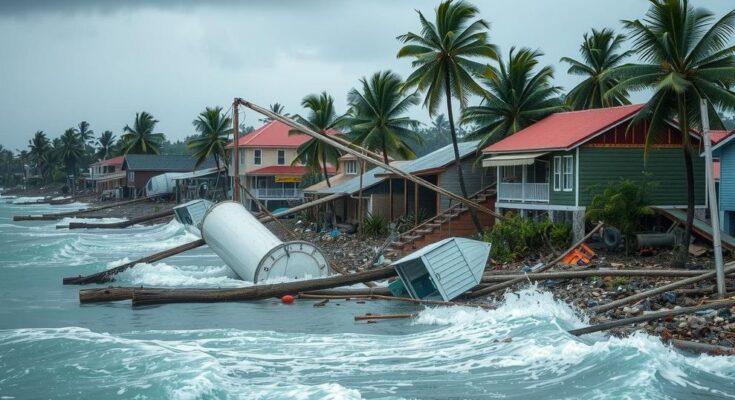Tropical Cyclone Chido has struck Mayotte, leaving local officials fearing nearly 1,000 casualties following widespread devastation, including housing and infrastructure damage. Rescue operations are ongoing in a territory heavily reliant on aid, which faced its worst storm in nearly a century.
In the wake of Tropical Cyclone Chido’s catastrophic impact on Mayotte, local officials are estimating a death toll that could approach 1,000, highlighting the devastating nature of this natural disaster that struck the French territory off the coast of Mozambique this past Saturday. The cyclone unleashed winds surpassing 200 kilometers per hour, resulting in extensive destruction of infrastructure, including homes and schools. By Monday, emergency teams were engaged in rescue operations amid significant challenges, with essential services such as water, power, and communications severely disrupted. The Prefect of Mayotte, Francois-Xavier Bieuville, reported a current death toll of 14, while emphasizing that the actual number is likely to be much higher as recovery efforts continue.
Mayotte, an overseas department of France, is located in the Indian Ocean, close to the coast of Mozambique. This territory, with a population of approximately 320,000, is known for its significant economic challenges and heavy reliance on aid from the French government. The severe weather patterns affecting the region have led to multiple natural disasters in the past, but Tropical Cyclone Chido is recognized as one of the most destructive storms to impact Mayotte in nearly a century, particularly affecting the densely populated areas where many residents live in makeshift housing.
The devastation caused by Tropical Cyclone Chido has left Mayotte in a state of emergency, with local officials fearing a substantial loss of life. As rescue efforts are underway, and with critical resources strained, the international community is called upon to provide assistance to this impoverished territory. This event serves as a stark reminder of the vulnerabilities faced by communities in disaster-prone areas and the urgent need for effective disaster preparedness and response frameworks.
Original Source: www.claimsjournal.com




